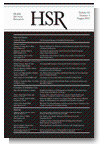
Neighborhood Effects on Post-Hospitalization Mortality: A Population-Based Cohort Study of the Elderly in Chicago
Abstract
CONTEXT: Place of residence is associated with health outcomes.
OBJECTIVE: To examine neighborhood effects on mortality after the onset of serious disease and to assess whether these effects vary for different sociodemographic or diagnostic subgroups.
DESIGN, SETTING, PATIENTS: Our sample consists of a complete cohort of 10,557 elderly Medicare beneficiaries throughout the city of Chicago newly diagnosed and hospitalized for the first time with one of five common serious diseases in 1993 (stroke, myocardial infarction, congestive heart failure, hip fracture, and lung cancer) followed until 1999. Attributes of 51 zip code neighborhoods were obtained both from census data (1990) and from a comprehensive social survey of neighborhood residents (1994-1995). Cox proportional hazards models with robust standard errors were specified.
MAIN OUTCOME MEASURE: Survival after hospitalization.
RESULTS: People who lived in neighborhoods with higher socioeconomic status (SES) or with a better social environment had significantly longer survival after disease onset. We evaluated the differential impact of neighborhood attributes on survival depending on gender, race, and poverty using interaction terms. Only the interaction terms between neighborhood social-structural factors and individual poverty were significant, suggesting that neighborhood SES and social environment were especially helpful for people with higher income. Neighborhood attributes did not differ in their impact depending on the race or sex of the subjects. Analyses of cause-specific mortality showed that myocardial infarction was the primary force driving the associations between neighborhood attributes and mortality.
CONCLUSIONS: Where people live matters with respect to posthospitalization mortality, but how neighborhoods affect this outcome depends on individual demographic and diagnostic characteristics. Myocardial infarction in particular may be a "neighborhood sensitive" condition. Individuals' health may depend not just on individuals' characteristics but also on their neighborhoods'.
Citation:
M. Wen and N.A. Christakis, "Neighborhood Effects on Post-Hospitalization Mortality: A Population-Based Cohort Study of the Elderly in Chicago" Health Services Research, 40(4): 1108-1127 (August 2005)